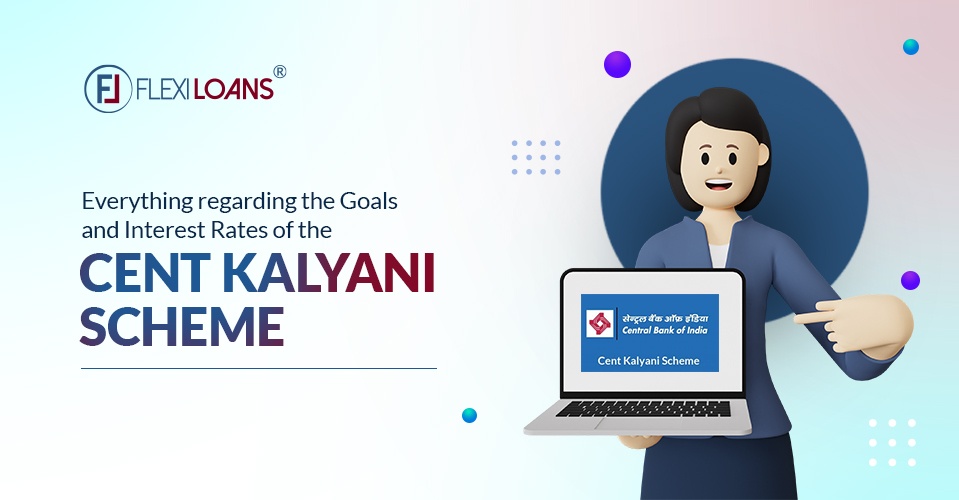Jul 24, 2022

Introduction
The Government of India has identified the need to assist women entrepreneurs and improve the condition of women in society. However, our society is still patriarchal, and women are not treated as equals in most walks of life.
The micro, small, and medium enterprises sector (MSME) is the dominant contributor to the GDP of the country. Around 63 million MSME units are operational, out of which only 20.3% of the units are run by women. These units are generally considered to be un-bankable and are deprived of the benefits of the formal banking system.
The Cent Kalyani Scheme was launched as a part of the Government of India’s financial inclusion policy. The main objective of the Scheme is to provide funds for women entrepreneurs to support them in their expansion of business.
Where to apply for the Cent Kalyani Scheme?
Central Bank of India, which offers the Cent Kalyani Scheme, is one of the leading Public Sector Banks in the country. The Central Bank of India has branches in all the States and Union Territories of India. They have a network of 4680 branches, of which 63% are in semi-urban and rural areas.
The Central Bank of India has several loan schemes for the MSME sector in its product line. The Bank also has a Woman Entrepreneur Cell dedicated to serving women business owners and providing them with the requisite banking facilities. The aspiring borrower may pay a visit to the nearest branch of the Central Bank of India or call the dedicated number of Woman Entrepreneur Cell 022 66387777 to get complete details of the Scheme.
What is Cent Kalyani Scheme?
The Cent Kalyani Scheme is an MSME loan product distributed through the Central Bank of India branches. The intended beneficiaries of the Scheme are women entrepreneurs.
The main objective of the Cent Kalyani Scheme is to encourage women business owners to expand their existing businesses and help women start their own MSME units.
The businesses planning to apply for the Cent Kalyani Scheme need to comply with the definition of an MSME as per the MSME Act, 2006. The company has to be engaged in providing service or in manufacturing. The units in retail trade or an education institute are not covered under Cent Kalyani Scheme. Self-help groups are also beyond the purview of the Cent Kalyani Scheme.
Cent Kalyani Scheme Eligibility Criteria
- The eligibility of the Cent Kalyani Scheme is as under:
- The business unit must comply with the MSME Act, 2006.
- A woman entrepreneur planning to start a business or planning for expansion of her existing MSME unit can apply.
- The woman entrepreneur has to be an Indian citizen.
- Self-employed professional, e.g., doctor, architect, and chartered accountant.
- Businesses include handloom, handicrafts, catering services, garment manufacturing, beauty parlours, tailoring units, crèche, STD booths, photocopying centers, and transport operators.
The loan to value (LTV) is 80%, which means the applicant for the Cent Kalyani Scheme has to put up 20% of the amount required for the capital expenditure as margin money.
The loan under Cent Kalyani Scheme may be offered as a fund-based term loan in the form of an overdraft or a cash credit. The Scheme may also be provided as a non-fund-based working capital loan like a Letter of Guarantee or Letter of Credit.
Documents required for Cent Kalyani Scheme
Applicants for Cent Kalyani Scheme are required to provide the following documents to the bank for processing the loan:
1. Proof of Identity:
Documents like Aadhar Card, Passport, PAN Card, Driving Licence, and Voter ID card.
2. Address Proof:
Acceptable documents are Aadhar Card, Passport, Voter ID card, electricity bill, and property tax receipt.
3. Proof of Income:
For income proof, audited balance sheet, and Profit & Loss Account, Income Tax returns are to be furnished to the Bank.
4. Proof of the existence of the business:
To prove the existence of a running business unit, a unit profile, along with any proof of hypothecation, must be submitted to the Bank.
What is the loan structure under Cent Kalyani Scheme?
The maximum loan available under the Cent Kalyani Scheme is Rs. 1 crore.
The Cent Kalyani Scheme interest rate chart is as under:
| Loan Amount (Rs.) | Rate of Interest |
| Up to Rs. 10 lacs | 9.70%+0.25% = 9.95% |
| More than 10 lacs up to 1 crore | 9.70%+0.50% = 10.20% |
If the units applying for loans have a good credit history backed by records in credit rating institutions like CRISIL, an additional discount of 0.25% will be passed onto the unit.
Salient features of Cent Kalyani Scheme
Following are some of the salient features of the Cent Kalyani Scheme:
· Processing Fees – There is no processing fees to be paid for Cent Kalyani Scheme.
· Collateral Security – No collateral security is necessary for Cent Kalyani Scheme.
· Primary Security – Bank will hold the materials procured with the loan amount as primary security until the loan is paid off completely.
· 3rd Party Guarantee – No requirement of 3rd party guarantee in the case of Cent Kalyani Scheme.
· Credit Guarantee Fund Trust for Micro and Small Enterprises (CGTMSE) fees – The CGTMSE fees for one year is paid by the Bank on behalf of the borrower.
· Insurance Coverage – The materials and equipment bought with the borrowed fund will have to be under comprehensive insurance cover with a bank clause endorsed on the face of the policy.
Conclusion
The Cent Kalyani Scheme distributed by the Central Bank of India is one of the popular available schemes for supporting women entrepreneurs. The Government of India has identified the need to empower women for the overall development of the economy. The government hence encourages women to avail of Schemes like these to support their existing business units. In addition, Cent Kalyani Scheme is also available for startups to motivate new entrants in women business owners.







